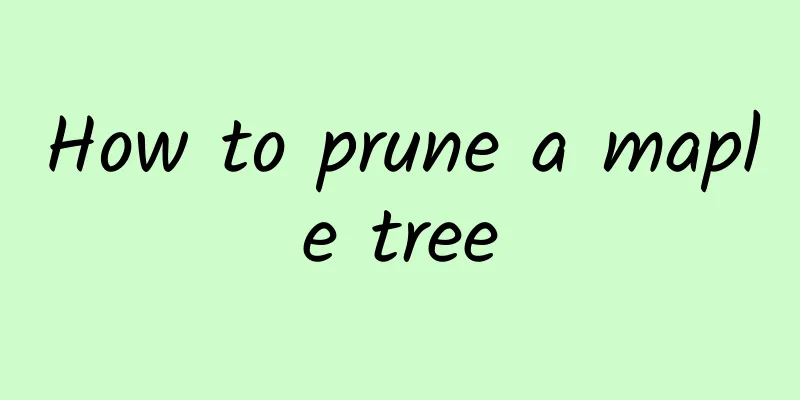How to prune orange trees

|
When growing orange trees, proper pruning is essential. It may seem like just a simple part of management, but it is the key point to improve fruit quality, optimize tree shape, and enhance resistance to diseases and pests. So what are the methods for pruning orange trees? Let’s learn more about it below. 1. Pruning requirements (1) Young tree pruning: mainly focusing on building a good tree shape. During the vigorous growth period of young trees, they need to be pruned, which will help expand the crown of the young citrus trees. (2) Fruit-bearing tree pruning: When the fruit-bearing period begins, the branches of citrus trees need to be pruned. Prune the side branches on the main branches of citrus trees in May and June every year to promote the development of the main branches; when the citrus trees enter the peak fruit-bearing period, it is necessary to prune the branches and fruits. At this time, you need to prune off branches that bear no fruit, grow slowly, or grow too densely. (3) Pruning after fruiting: After the fruits are picked, it is necessary to promptly prune away dead branches, broken branches, and branches with worm holes on the citrus trees. To ensure the normal growth of citrus trees next year. 2. Pruning method (1) Shortening: Cut off the front part of the branch and keep the base. In this way, branching can be promoted and 2-3 buds below the cut can be stimulated to sprout. (2) Thinning: This means cutting off the branches of citrus trees from the base. Thinning can make the remaining young branches thicker, speed up growth, improve ventilation conditions for the tree, and increase photosynthesis. (3) Pruning: Pruning is often used to renew large branches in adult or aging trees whose branches have declined in apex or whose crowns are dense on the outside but hollow on the inside, in order to renew large branches in the crown. (4) Pinching: When the new branches of citrus trees grow to a certain length and before the branches become lignified, the tops of the tender shoots should be removed by hand, which is called pinching. (5) Remove buds and release shoots: When new shoots grow to 1-3 cm, remove the buds to stimulate the growth of new shoots. Since citrus has multiple buds, removing the sporadic main buds can stimulate the germination of secondary buds and other nearby buds, and produce more new shoots. (6) Auxiliary pruning: In citrus tree pruning, there are methods of supporting, pulling and hanging branches, which are auxiliary measures of pruning. They are generally used to fix citrus trees, change the growth direction of branches and increase the branch angle. Its function is to increase the branch angle of citrus trees, slow down the growth potential, improve light conditions and promote flower bud differentiation. In general, pruning citrus trees is important, but don't do it casually. You have to master the method. The specific pruning work will be reasonably planned according to the tree age, growth conditions and cultivation goals.
|
<<: How to prune Million Bells and how to quickly regrow them
>>: How to care for agapanthus in winter and what to do if it doesn't bloom
Recommend
Coffee Growing Conditions and Characteristics
Coffee Growing Conditions Coffee is generally sui...
Violet Flower Language
1. Flower language introduction 1. White: The flo...
Common diseases of crape myrtle and their prevention and control methods
Powdery mildew on crape myrtle symptom Powdery mi...
Where is oil sunflower suitable for planting?
Sunflower planting area Generally, sunflowers gro...
Is the palm tree suitable for indoor cultivation?
1. Suitable for indoor breeding Livistona can be ...
Cultivation methods and precautions of Daphne odora
1. Soil The potted Osmanthus fragrans has relativ...
The efficacy and function of monk fruit
The role of monk fruit Monk fruit is known to mos...
How to raise Tia
1. Maintenance methods 1. Soil: The soil used for...
The meaning of Chinese rose
The Flower Language of Rose There are many variet...
Can ginseng run away?
1. Will it run? Ginseng actually cannot run. It i...
Where is the main production area of Maca?
Maca growing environment Maca is native to high-a...
Sweet pea planting time and method Sweet pea planting and management
Peas are semi-cold-resistant crops. They can surv...
Common diseases of osmanthus
Brown spot symptoms In the early stage of the dis...
Greenhouse melon planting technology and management methods Greenhouse melon cultivation key points
Many people call melon muskmelon. It is a fruit t...
What to do if the leaves of Cordyceps turn yellow
Cordyceps often sprays water Cordyline needs to b...









